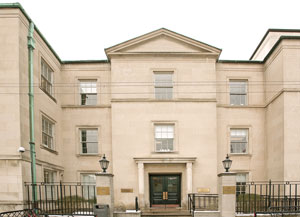A former lawyer from Florida, who spent two years in prison for a child pornography charge, is one step closer to acquiring a licence to practise law in Ontario.

The Law Society of Upper Canada’s hearing tribunal has determined that Ronald Davidovic, who was born in Montreal but moved to the United States as a child, has proven he took the necessary steps to rehabilitate himself and that he is of good character, a requirement in the licensing process.
Davidovic was imprisoned in a federal penitentiary and registered as a sex offender after he pleaded guilty to a count of “receiving material containing the visual depiction of minors engaging in sexually explicit conduct,” according to the decision.
In 2004, police executed a search warrant at Davidovic’s home and seized his computers. He subsequently admitted to police and to his wife at the time that he had viewed child pornography since 1998.
He was also originally charged with a count of possessing child porn, but that was dropped when he pleaded guilty to the other charge.
Benchers Raj Anand and Jan Richardson, who served on the panel, decided to grant Davidovic’s application.
“The applicant’s conduct in the years preceding 2004 was reprehensible, but it is not an automatic or permanent bar to his admission, given the evidence and positions of the parties, and in light of the applicant’s determination to be an ethical and productive lawyer,” Anand and Richardson said in the decision,
Law Society of Upper Canada v. Davidovic. Bencher Paul Cooper held the lone dissenting opinion on the split three-member panel.
The tribunal used what is called the five “Armstrong factors” in determining whether Davidovic was in present good character, which is a requirement for the issuance of a licence to practise law.
These factors include the nature and duration of the misconduct, whether the applicant is remorseful, the rehabilitative efforts that have been taken and their success, as well as the applicant’s conduct since the misconduct and the amount of time that has passed since.
Anand and Richardson determined that Davidovic had made repeated statements of remorse and that the risk he would reoffend was very low.
They also noted that there is no evidence of recurrence or subsequent bad behaviour on Davidovic’s part in the 13 years since he was charged.
Davidovic says he was very excited and pleased with the decision.
“I’m very fortunate to have an opportunity to be able to practise my chosen profession again,” he said in a phone interview from Florida.
Davidovic provided the tribunal with a number of reports to support his application, which were written by a reverend who served as his therapist, a social worker who conducted a court-ordered treatment program and a doctor who conducted a psychological evaluation and risk assessment of Davidovic in 2013.
The tribunal also received transcripts of recent interviews an LSUC investigator conducted with those who wrote the reports.
The law society’s counsel in the matter, Amanda Worley, did not oppose Davidovic’s application after he provided testimony. In his dissenting opinion, Cooper found that Davidovic had failed to prove he was rehabilitated.
He found the reports from the social worker and the reverend were dated, anecdotal and not scientific and that testimony given by Davidovic lacked reliability.
“The seriousness of Mr. Davidovic’s misconduct cannot be bootstrapped by conditions when residual concerns linger about his present good character,” Cooper said.
In 2004, Davidovic petitioned the Florida Supreme Court for a disciplinary resignation and was granted permission to resign from the Florida bar with leave to appeal in five years. He did not reapply in Florida, but in 2015, he applied to the LSUC for a licence to practise in Ontario, as he plans to move to Toronto where he has family.
Davidovic says he chose to apply in Ontario because there are all sorts of impediments in Florida that make it difficult to live day to day for someone convicted of such an offence. Before his conviction, Davidovic had practised in estate and financial planning in his early career before going on to act as general counsel for a large telecommunications company.
Davidovic is still an applicant in the licensing process.
A spokeswoman for the law society said it is policy not to interpret or comment on decisions made by the tribunal hearing panel.

 The Law Society of Upper Canada’s hearing tribunal has determined that Ronald Davidovic, who was born in Montreal but moved to the United States as a child, has proven he took the necessary steps to rehabilitate himself and that he is of good character, a requirement in the licensing process.
The Law Society of Upper Canada’s hearing tribunal has determined that Ronald Davidovic, who was born in Montreal but moved to the United States as a child, has proven he took the necessary steps to rehabilitate himself and that he is of good character, a requirement in the licensing process.